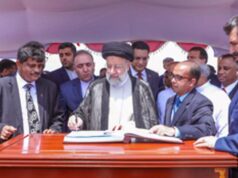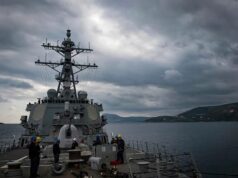India and Maldives had signed an Action Plan for defence cooperation in 2016. Several joint defence projects had been planned but their implementation got stalled, as relationship with India deteriorated.
The previous government turned hostile towards India and so New Delhi and Malé had drifted Apart. President Abdulla Yameen became cosy with China despite a professed ‘India First’ policy. Pakistan’s army chief Qamar Javed Bajwa, was the first foreign leader to visit Maldives last year after the Yameen government had lifted the widely-criticised 45 days state of emergency.
The Yameen government even tried to send back two helicopters gifted to it by India. The new government of President Ibu Solih, which took over in November 2018 has now, reversed every thing.
Didi, Maldives’ first woman defence minister currently on an official visit to India, accompanied by the chief of Maldives National Defence Forces (MNDF), Major General Abdulla Shamaal has held talks with Indian defence minister Nirmala Sitharaman.
Stating that Maldives does not require close military cooperation with other countries besides India, Maldivian defence minister Mariya Didi said that discussions with Indian counterparts focused on implementing previously stalled projects, including the development of coast guard facilities.
“India respects our sovereignty, they do not talk about our relations with other countries. [As far] as we are concerned, we are very comfortable having India as our very close friend because they always came to our rescue – in 1988, the 2004 Tsunami or the recent water crisis,” she said. Didi said that there had been no mention of China – or Pakistan – during discussions with India.
Didi clearly stated that “ closest neighbour has been India and they have always been there to help, so there is absolutely no need to have any other sort of military cooperation with any country as such.” She also revealed that “all issues will be sorted within a few months” for the transfer of a Dornier aircraft as committed by India in the Action Plan. The installation of the coastal radar surveillance system, funded by India, would also be completed.
The Defence Minister noted that the Indian helicopter with Maldives was used to rescue the Mayor of Addu city, who had been lost at sea during a fishing expedition. “I don’t understand why it’s use was stopped for a while. I don’t know how we can manage without the helicopters,, 160 lives have been saved because of them.”
Maldives, she noted, wanted to keep the Indian ocean region a protected zone, “where the bigger powers don’t engage in a way that could perhaps be detrimental to the interests of our nation.”
The second round of the India-Maldives Defence Cooperation Dialogue also took place on Thursday, co-chaired by the MNDF chief and the Defence Secretary at the Indian MoD.
MNDF chief Major General Abdulla Shamaal stressed the need to develop coast guard facilities for Maldives. “There is a need to have repairs and [construct] a pier for berthing. At the time, we are at the discussion stage. Also a decision would be soon made whether the construction at Uthuru Thila Falhu should go ahead or if the civil port at nearby Thilafushi island would be expanded.”
The chief of Maldives defence forces said that talks revolved around ways to put in “collaborative structures” in information sharing and “fusion mechanism”.
A top priority had been the proposal for India to “partner” with Maldives in the planned development of infrastructure for the coast guard at the atoll of Uthuru Thila Falhu. As per the Action Plan, Maldives would allow India to have access to the facilities for training, Humanitarian Assistance And Disaster Relief (HADR) and surveillance of the Exclusive Economic Zone (EEZ).



